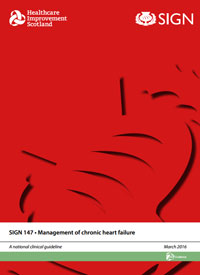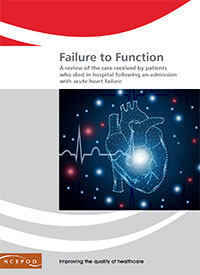Introduction
Quality statements, a concise set of prioritised statements designed to drive measurable quality improvements within a particular area of health or care,were developed for psychological care in HF. These standards allow health care practitioners to make decisions about patient care based on the latest evidence and best practice. They provide criterion against which to inform and measure improvements in local health board areas and general parameters on which to base competencies for staff to work psychologically in HF. The aim of the IAPT-HF project is to work towards achieving these standards across Scotland.
Recognition of distress
People with heart failure should have their psychological well being monitored at every contact with their HF health care professional, assessing for the presence and symptoms of psychological distress
Psychological distress is common in people with heart failure. Assessment of psychological wellbeing which includes identification of psychological distress (e.g. anxiety or depression) can help the individual with heart failure understand and manage their condition and adjust to living with it. Appropriate use of validated assessment tools can help to ensure that the most appropriate treatment can be offered at the earliest opportunity.
GAD7
PHQ9
Forth valley case study
Psychological intervention
People with heart failure, recognised as experiencing psychological distress should be offered access to evidence-based psychological interventions appropriate to their needs and preferences
Evidence based psychological interventions can be effective treatments for psychological distress such as depression and anxiety; and behavioural difficulties such as non-adherence to medical treatment regimes. Psychological interventions can help patients with heart failure self-manage, cope with symptom burden and adjust to living with their condition. Healthcare professionals should offer the least intrusive, most effective intervention first, in line with a collaborative stepped care approach.
Treatment Monitoring
People with heart failure, receiving a psychological intervention, should have their response to
treatment monitored at each appointment using validated outcome measures and the delivery of
their treatment adjusted in response to such outcomes
Regular monitoring of response to psychological treatment ensures that the effectiveness of the
treatment can be assessed and allows for the adjustment of the treatment if necessary; given the
unpredictable and fluctuating nature of heart failure symptoms.
PHQ9
GAD7
PHQ4
Clinical Pathway
Heart failure services should have a clearly defined clinical pathway detailing the provision of psychological assessment and care for people with heart failure including systematic, routine monitoring of psychological well-being and ready access to psychological therapy as appropriate
Clinical pathways are multi-disciplinary plans of best clinical practice. They are designed to promote the implementation of guidelines and protocols. They support clinical effectiveness, risk management and clinical audit. They can improve patient outcomes. Each health board’s clinical pathway will look different depending upon resources and structure.
Clinical Pathway Diagram
Training for Healthcare professionals working within HF services
Healthcare professionals working within HF services should complete a NES-endorsed training programme to enhance their knowledge and skills of psychological care
Evidence-based psychological interventions can be effective treatments for psychological distress such as depression and anxiety and behavioural difficulties such as non-adherence to medical treatment regimens. Psychological interventions can help patients with heart failure self-manage, cope with symptom burden and adjust to living with their condition. Often as the first contact, healthcare professionals working within HF services have a unique opportunity to assess and manage psychological distress in HF patients. However this may not be a core component of their training, therefore they should have access to NES endorsed training programmes to enhance their skills of psychological care.
Training algorithm diagram
Emotion matters
Supervision for Healthcare professionals working within HF services
Healthcare professionals working within HF services delivering psychological interventions should have regular and routine access to consultation and/or supervision with a suitably qualified psychological therapist to optimise the competency and delivery of interventions
Given the expanding role of healthcare professionals working within HF services and the increasing requirement to assess for and manage psychological distress in HF patients, healthcare professionals working within HF services should have access to consultation with a suitably qualified psychological therapist. This will support the continued development and consolidation of psychological skills and thereby further improve the quality of psychological support provided by healthcare professionals working within HF services.



